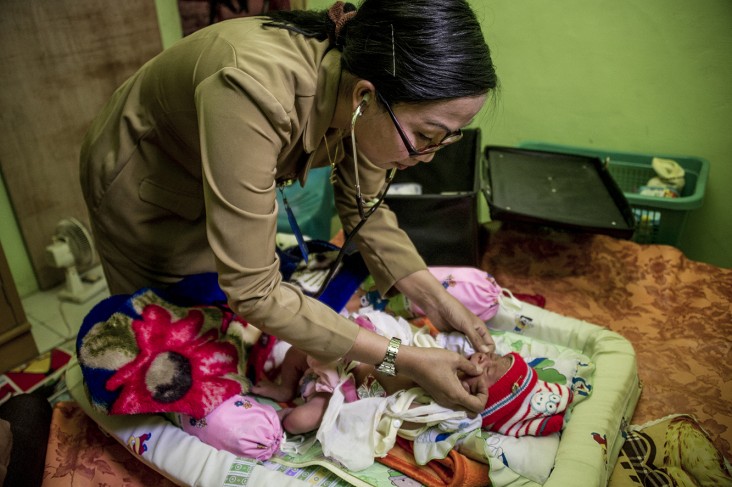
Infectious diseases pose a global health security threat because of their ability to spread quickly and cross national borders. Diseases and poor health systems inflict harm on humans, animals, and countries’ economies. Under the U.S.-Indonesia Strategic Partnership (2015), the U.S. and Indonesia agreed to expand health cooperation to strengthen Indonesian health systems and to increase local capacity to prevent, detect, and respond to global health challenges while advancing security and prosperity.
On behalf of the American people, the U.S. Agency for International Development (USAID) partners with the Government and people of Indonesia to control tropical and infectious diseases, including tuberculosis, HIV/AIDS and lymphatic filariasis. USAID also supports the Government of Indonesia’s (GOI) efforts to improve emergency care for mothers and newborns.
- USAID helped 100,000 Indonesian mothers and newborns get quicker access to emergency care with a new mobile phone app.
- USAID expanded access to quality diagnostics in Indonesia, the world’s 2nd highest TB-burden country, by strengthening TB lab capacity.
- USAID restored poultry farmers' livelihoods in 12 high-risk Indonesian provinces by improving animal health safety practices.
Current Programs
Controlling Pandemic Threats and Infectious Diseases
Pandemic Threats: Indonesia is considered a hotspot for emerging diseases due to its climate, biodiversity, the close interaction between humans and animals, deforestation, and land-use changes. During the 2005-2010 avian influenza crisis, USAID in collaboration with the UN Food and Agriculture Organization (FAO) supported the GOI to significantly reduce poultry outbreaks and help bring the crisis under control. Additionally, through the World Health Organization (WHO), USAID supports the GOI and other partners to integrate human and animal disease surveillance and strengthen the health system to control acute respiratory infections (ARI).
USAID helps the GOI to identify risks and respond to potentially dangerous pathogens in animals before they become threats to human health, including support for globally important research and surveillance. USAID also supports the GOI’s leadership of the Global Health Security Agenda to reduce the threat of infectious diseases.
HIV/AIDS: Indonesia is experiencing an expanding HIV epidemic with an estimated 691,040 people infected. In Papua, the prevalence rate is 15 times higher than the national rate of 0.4 percent. USAID provides technical assistance to GOI to accelerate the use of effective prevention measures, expand HIV testing and treatment, and to increase the use of strategic information to respond to the epidemic. USAID also helps civil society organizations (CSOs) increase their technical and organizational capacity to expand the reach of HIV and AIDS health services.
Tuberculosis: Every year in Indonesia, there are an estimated one million new TB cases and 100,000 TB-related deaths -- a person is infected about every 30 seconds. Cases of Multi-Drug Resistant TB (MDR-TB) are on the rise. USAID partners with Indonesia’s National TB Program to improve case detection and treatment; improve laboratory services; expand the number of MDR-TB treatment facilities; and enable the quality and supply of anti-TB drugs. In 2012 USAID helped introduce GeneXpert technology that diagnoses MDR-TB in hours instead of months, which has greatly increased the number of people being put on treatment. Working with NGOs, our projects strengthen community support for TB patients by combating the social stigma they face. USAID is also providing technical assistance to Indonesian drug manufacturers to seek WHO pre-qualification for domestic production of TB drugs.
Neglected Tropical Diseases (NTD): More than 86 million people – about 1/3 of Indonesia’s population – are estimated to be at risk for lymphatic filariasis (elephantiasis), and intestinal worms are endemic nationally. USAID supports the GOI to map the disease burden, develop national strategies for their elimination, and supported community-based campaigns that provided preventive chemotherapy to 186 million people in 50 districts in FY 2015. In addition to USAID’s close partnership with the GOI’s National NTD Program, USAID maintains strong relationships with the private sector, local and international NGOs, WHO, and universities.
Supporting the Poorest and Most Vulnerable
USAID supports Indonesia’s efforts to increase access to quality basic services, including clean water and improved sanitation -- with an emphasis on reaching low-income and vulnerable people in urban areas to reduce diarrhea and other waterborne illnesses. USAID helps to improve governance within public and private water utilities and increase demand for, and access to, basic sanitation in communities. USAID partners with local banks to provide microfinance loans to low-income families in order to pay for water installation fees, one of the major barriers to water access. Poor communities have reduced the cost of water by approximately 60 percent through USAID’s programs.
Reducing Preventable Deaths of Mothers and Newborns
Indonesia has among the highest maternal and neonatal death rates in the region - 40 mothers and 247 newborns die every day. USAID supports Indonesia’s efforts to reduce these preventable deaths by strengthening its health care infrastructure and service provision with a special focus on the poorest and most vulnerable populations. With quicker referral systems, better equipped facilities and more knowledgeable health care staff, the lives of more mothers and newborns with complications can be saved. USAID helps build sustainable local responses and health systems by mentoring health practitioners on improved management and responses to complications during and after childbirth. USAID works with UNICEF in Eastern Indonesia to improve maternal and newborn care and prevent malaria in pregnancy. Investing in maternal and newborn health leads to stronger, more stable societies.








Comment
Make a general inquiry or suggest an improvement.